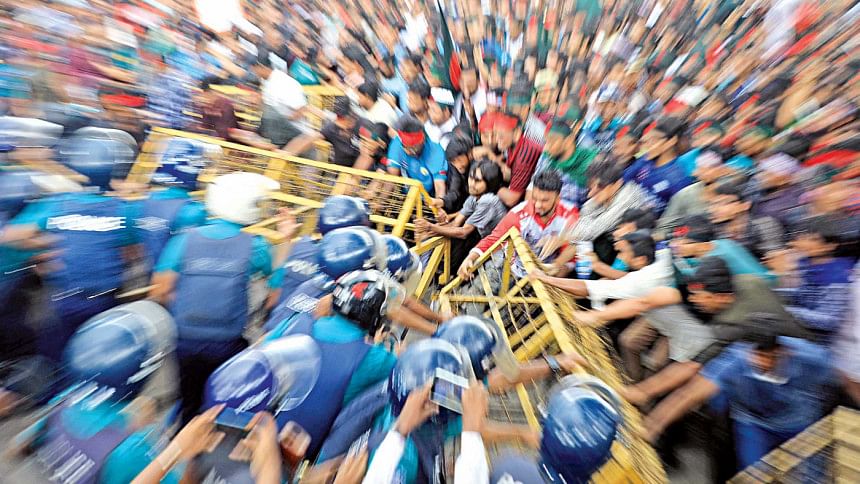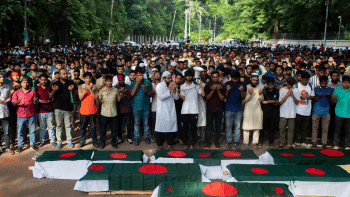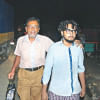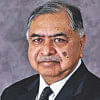Saluting the spirit of our young people

There is no shame in admitting that in the last few days many of us have cried helplessly, over the senseless deaths of students—teenagers or in their early twenties—the same age or close to the ages of our children. The first time we saw the video of Abu Sayed, one of the coordinators of the movement in Rangpur, being shot to death as he spread out his hands in surrender, our hearts broke at the ruthlessness of a law enforcer, repeatedly shooting at a young man who was practically unarmed. But our hearts filled with awe at the bravery of this young man who was so steadfast in a cause that demanded equal opportunity for young people to compete for government jobs.
Amidst the anguish and despair, this is what stands out the most—the spirit and courage of our young people. Our young students have proved to us once again that they are a conscious generation—contrary to common perception of them. They are well aware of the reality they are surrounded by and do not live in a bubble. We got a glimpse of this clarity of purpose during the 2018 Road Safety Movement by school students after a few of their fellow students were crushed by a raging bus at a bus stop. Their outrage took a positive form as they organised themselves into monitoring groups and started checking vehicles for their fitness, licenses etc. They were doing the job the traffic police were supposed to be doing and trying to implement basic road safety rules that should have been enforced by the government a long time ago. They showed us what their state had failed to do, which was to keep people safe from the road crashes we have become notorious for. On the streets, we saw uniformed school kids stopping vehicles—even VIP cars going the wrong direction were turned back—and checking documents. What we saw in those young faces was hope, belief in a better future, a saner world where people do not have to worry whether they will come home alive, every time they step into the streets. Their selflessness, determination and immense courage, gave us an optimism we had forgotten how to feel anymore. Sadly, their movement was nipped in the bud with violence and intimidation, though it didn't erase the fact that they had made history during those days and shown the country their worth as leaders.
The anti-discrimination protests for quota reform started the same year and was considered successful as it led to the government to abolish the quota system altogether. This move, however, done in haste and possibly in a huff, proved to be controversial when the High Court ruled in July 2024, that it was unconstitutional and had to be scrapped leading to the second anti-quota protests. As we know, the anti-discrimination movement was never one to abolish all quotas but to come up with a logical, fair percentage for the various marginalised groups.
The young leaders of the current movement—Students' Movement against Discrimination—from what we saw through clips of videos aired by the media (before the internet blackout), seemed to have a much more determined and organised plan. Their agenda was the same as before—to have a reasonable quota system that would give more opportunity for regular, non-quota BCS candidates a chance to compete for government positions. They were challenging the system that gave 30 percent quota to freedom fighters, their children and grandchildren, a quota which, even many freedom fighters feel, is outdated and unnecessary after 53 years of independence.
The peaceful demonstrations started to spread all over the country, and were joined not only by students of public universities but private universities, colleges and even schools—young people who joined in out of solidarity for their brothers and sisters. This fraternity of students was something so beautiful to witness that we, the grownups, could not help but feel proud despite the inconvenience of prolonged traffic jams and restrictions on movement. The cause they were demonstrating for in the heat and rain, for hours on end, was justified and there seemed no reason for the government not to endorse it with open arms.
But what happened in the following days is a painful reminder of the disconnect between our leaders and their young population. The government decided to "nip it in the bud" yet again but this time their strategy backfired badly. The students refused to back down, even after they were beaten mercilessly by ruling party goons, even when the pellets from police shotguns pierced their young bodies and blinded their eyes, even when live bullets went through their hearts. The more force and brutality were inflicted on them, the more their numbers swelled in the demonstrations, the more resolute they became. It is this fearlessness that has shown us what these young people are made of.
While the movement was derailed by the government's disproportionate use of force that took the lives of at least 146 people, many of them students and innocent bystanders, which gave the scope for political and extremist elements to carry out vandalism and arson attacks, the steadfastness of the student protesters of the current quota reform movement remained. While we can never reconcile ourselves with this unprecedented level of violence and deaths, we will never forget those bright young faces, their fiery speeches and articulate understanding of the realities they live in. Those heroes who literally took the bullet to bring about change will be remembered as crucial figures of a tipping point in history.
Aasha Mehreen Amin is joint editor at The Daily Star.
Views expressed in this article are the author's own.
Follow The Daily Star Opinion on Facebook for the latest opinions, commentaries and analyses by experts and professionals. To contribute your article or letter to The Daily Star Opinion, see our guidelines for submission.


 For all latest news, follow The Daily Star's Google News channel.
For all latest news, follow The Daily Star's Google News channel. 









Comments